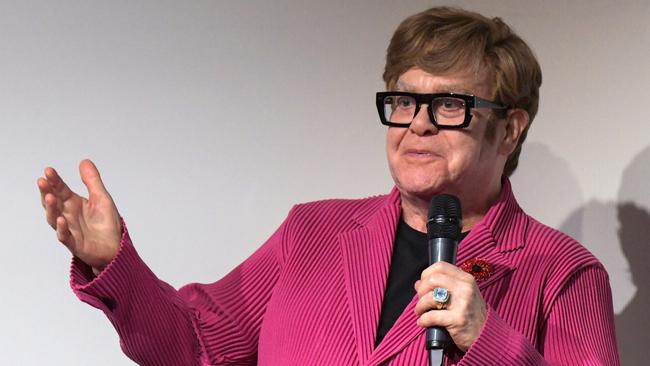Sir Elton John’s AIDS charity blacklisted in Russia
Sir Elton John’s AIDS foundation has been designated an ‘undesirable organisation’ and cannot operate in Russia.

Sir Elton John’s AIDS foundation has been designated an “undesirable organisation” and cannot operate in Russia, in the latest sign of President Valdimir Putin’s state-sponsored homophobia.
The foundation, established in 1992, has raised more than $US600m to help thousands of projects in 95 countries increase access to healthcare, tackle stigmatisation of LGBT people, and end AIDS, all guided by “love, compassion and humanity”.
In Putin’s Russia, however, it has been targeted for its “propaganda of non-traditional sexual relations, Western models of the family, and sex change”.
Russia’s prosecutor-general said that the foundation had “a negative attitude towards countries that defend traditional spiritual-moral values” and that, since the beginning of Putin’s war in Ukraine, the group had “taken part in an information campaign to blacken Russia”.
The foundation said it was devastated by the decision of the prosecutor general’s office, which will prevent it “from providing lifesaving care to people living with HIV in Russia”.
It said it had worked for more than two decades in collaboration with federal and non-governmental partners in Russia to provide hundreds of thousands of people with vital HIV services, including testing, treatment and care.
“This work is urgent: in 2024, there were over 1.2 million people living with HIV in Russia, with over 430,000 not receiving treatment,” it continued, adding: “Today’s decision by the Russian Federation will undoubtedly endanger lives and disrupt critical HIV prevention efforts for ordinary Russian citizens. At a time when we have the tools and knowledge to defeat HIV, it is heartbreaking to be unable to support them.”
Sir Elton, who came out as bisexual in Rolling Stone magazine in 1976, played concerts in the USSR three years later, helping erode Cold War tensions, and remained popular into the post-Soviet era.
Performing in Moscow in 2013, he criticised as “inhumane and isolating” a Russian law approved by Putin that made it illegal to distribute “propaganda” of LGBT lifestyles among children.
The next year Putin, in an attempt to deny prejudice against homosexuals under criticism for the law, described Sir Elton as an “extraordinary person”.
A year later, in 2015, Sir Elton was hoodwinked into believing he was talking to Putin about gay rights by two Moscow pranksters who have fooled a series of Western leaders and other figures, and received a state award at the Kremlin for their efforts.
Days earlier, the singer had asked in a BBC interview for a meeting with Putin to discuss LGBT equality, saying the Russian leader’s attitude towards gays was “ridiculous” and “prejudiced”.
The real Putin did eventually call Sir Elton, asking him not to be offended by the “harmless” prank. However, scenes involving gay sex and drug-taking were excised from Rocketman, a biopic about the star, when it was released in Russia in 2019.
Central Partnership, the film’s distributor, said the scenes were removed to comply with Russian legislation, without identifying the law.
The Elton John AIDS Foundation has worked in the past with organisations in Russia, helping provide HIV self-testing kits, counselling and advice on HIV and drug addiction.
The prosecutor general said the foundation had worked closely with groups designated as “foreign agents”, an official term used to smear organisations deemed to be foreign-funded and critical of the authorities.
Under a law on “undesirable organisations” approved by Putin in 2015, prosecutors can shut down groups deemed to undermine state security, national defence or “constitutional order”.
In a joint statement at the time, Amnesty International and Human Rights Watch said the law would “bolster an ongoing draconian crackdown, which is squeezing the life out of civil society” in Russia.
Sir Elton once described his 1979 trip to the Soviet Union as “one of the most memorable and happy tours” he had been on, adding that the last show in Moscow was “probably one of the best concerts I’ve ever given in my life”.
THE TIMES



To join the conversation, please log in. Don't have an account? Register
Join the conversation, you are commenting as Logout